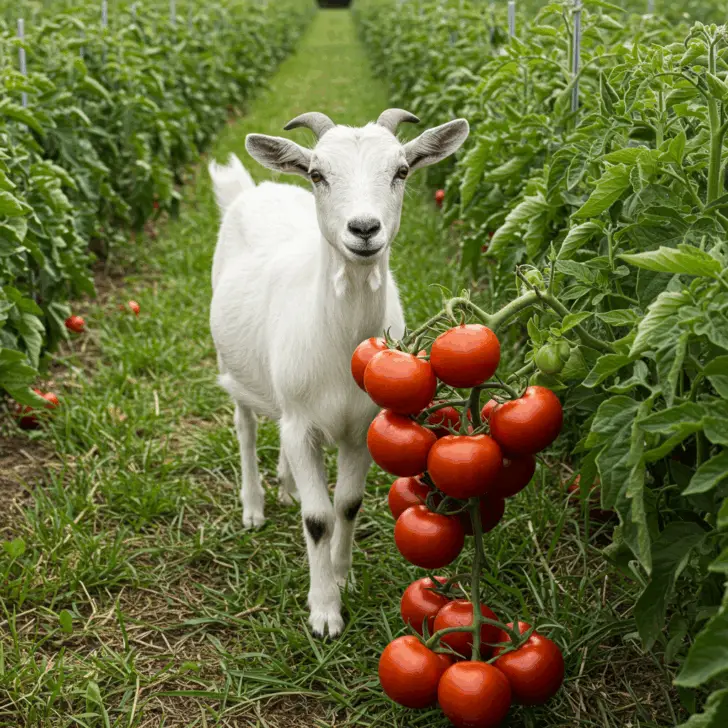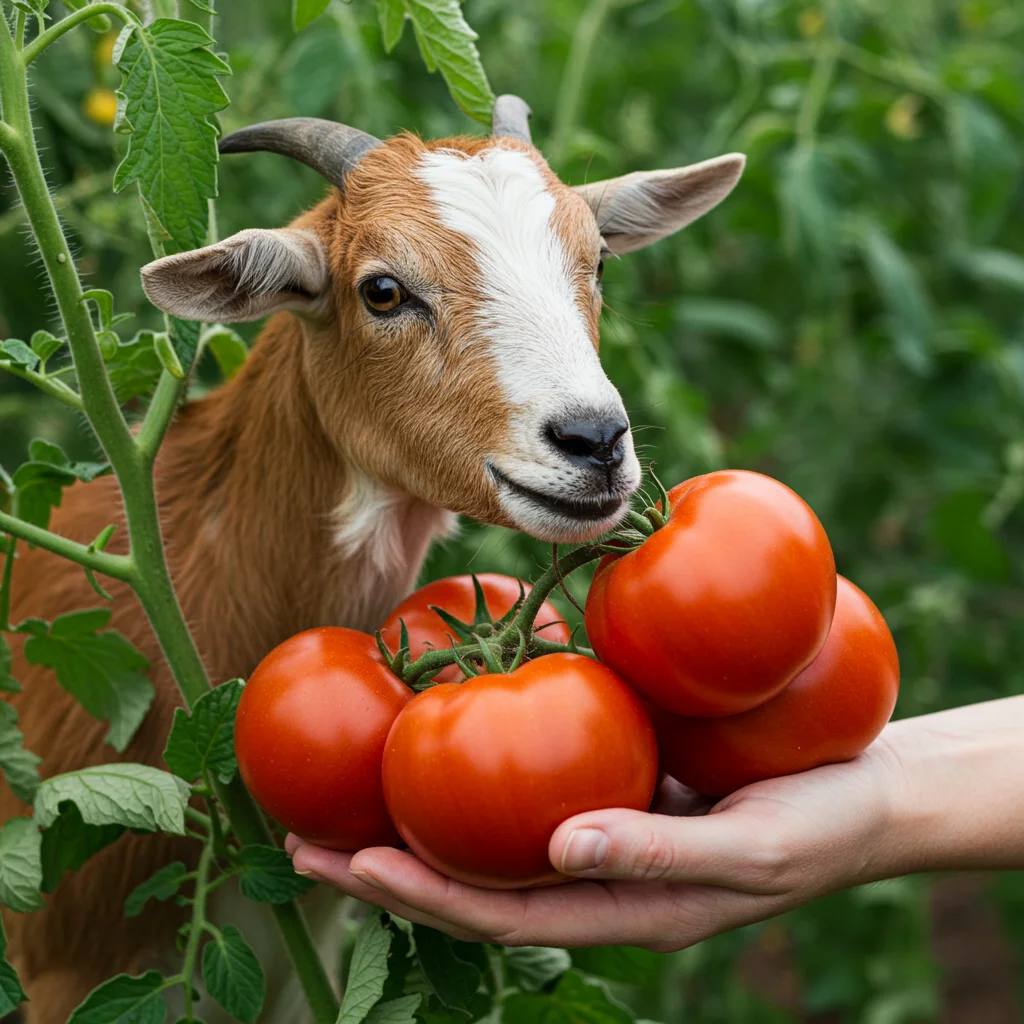This post explores the question, “Can goats eat tomato plants?” We’ll dive into the details of whether tomato plants are safe or toxic for goats, examining the potential risks and benefits, and offering guidance on feeding practices. We’ll also cover safe alternatives and answer frequently asked questions to provide a comprehensive understanding of this topic.

Goats are known for their voracious appetites and ability to consume a wide variety of vegetation. However, not all plants are safe for them. This post aims to clarify whether tomato plants fall into the safe or toxic category for our caprine friends.
JUMP TO TOPIC
Understanding Goat Dietary Needs
Goats are ruminant animals, meaning they have a complex digestive system specifically designed to break down plant matter. Their diet primarily consists of browsing on a variety of plants, including grasses, weeds, shrubs, and tree leaves. While their digestive system is robust, certain plants can be harmful, even deadly. Therefore, understanding their nutritional needs and identifying potential toxins is crucial for responsible goat ownership.
Essential Nutrients for Goats
A balanced goat diet should include adequate amounts of:
Fiber: Crucial for proper rumen function and overall digestive health. Sources include hay, grass, and browse.
Protein: Necessary for muscle development, milk production, and overall growth. Good sources include legumes, alfalfa, and some grains.
Vitamins and Minerals: Essential for various bodily functions, including immune system support, bone health, and reproduction.
Potential Toxins and Goat Health
Many plants contain naturally occurring toxins that can pose a threat to goats. Some of these toxins can cause mild digestive upset, while others can lead to severe illness or even death. It’s essential to be aware of common toxic plants in your area and ensure your goats don’t have access to them. [/internal-link/toxic-plants-for-goats]
The Tomato Plant: Friend or Foe?
The tomato plant (Solanum lycopersicum) belongs to the nightshade family (Solanaceae), which contains several plants known to be toxic to animals, including potatoes and deadly nightshade. This raises the question of whether tomato plants are safe for goats.
The Toxicity of Tomato Plants
While ripe tomatoes are generally considered safe for goats in moderation, the green parts of the tomato plant – including the stems, leaves, and unripe fruit – contain toxic compounds called glycoalkaloids, primarily tomatine. These compounds can cause digestive upset, weakness, and other health problems in goats.
Tomatine and its Effects on Goats
Tomatine disrupts cell membranes, potentially leading to a range of symptoms. The level of toxicity varies depending on the amount consumed, the size and health of the goat, and the specific variety of tomato plant.
Can Goats Eat Ripe Tomatoes?
Ripe tomatoes contain significantly less tomatine than green parts of the plant. Therefore, offering a small quantity of ripe tomatoes as an occasional treat is unlikely to cause harm to healthy adult goats. However, it’s important to introduce them gradually and monitor for any adverse reactions. Overfeeding ripe tomatoes can also lead to digestive issues, such as diarrhea.
Safe Gardening Practices with Goats Around
If you have goats and a garden, taking precautions is essential to prevent accidental ingestion of tomato plants:
Fencing: Securely fence off your garden area to prevent goats from accessing tomato plants.
Supervision: Never allow goats to roam unsupervised in areas where they may encounter tomato plants.
Alternative Forage: Provide plenty of safe forage options for your goats, such as hay, grass, or browse, to minimize their temptation to nibble on potentially harmful plants.
[/internal-link/goat-proof-garden] – Learn how to create a goat-proof garden to safeguard both your plants and animals.
Alternatives to Tomato Plants for Goats
Several safe and nutritious alternatives to tomato plants can be offered to goats:
Leafy Greens: Offer a variety of leafy greens like lettuce, spinach, and kale (in moderation).
Fruits: Apples, bananas, and berries (in moderation) can be a healthy treat.
Vegetables: Carrots, cucumbers, and squash are generally safe for goats.
* Browse: Provide access to safe browse like willow branches, maple leaves, and mulberry branches.
FAQs: Goats and Tomato Plants
Q: What should I do if my goat eats a tomato plant?
A: Monitor your goat closely for any signs of illness, such as lethargy, loss of appetite, or diarrhea. Contact your veterinarian immediately if you observe any unusual symptoms.
Q: Can goats eat cherry tomatoes?
A: Similar to larger tomatoes, ripe cherry tomatoes can be given in moderation. However, avoid the leaves and stems.
Q: Are all parts of the tomato plant toxic to goats?
A: While all parts contain tomatine, the highest concentrations are found in the leaves, stems, and green, unripe fruit.
Q: Are there any benefits to goats eating tomato plants?
A: No, there are no significant nutritional benefits to justify the risks associated with goats consuming tomato plants.
Q: Can goats develop a tolerance to tomatine?
A. No, goats do not develop a tolerance to tomatine. Repeated exposure can lead to cumulative toxicity.
Conclusion
While ripe tomatoes can be offered sparingly as an occasional treat, the green parts of the tomato plant are toxic to goats and should be avoided. Responsible goat ownership involves understanding their dietary needs, identifying potential hazards, and providing a safe environment. By offering a variety of safe and nutritious alternatives, you can ensure your goats maintain optimal health and well-being. Consult your veterinarian for personalized dietary advice for your goats. Always prioritize safe grazing practices to protect your herd.

